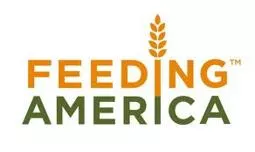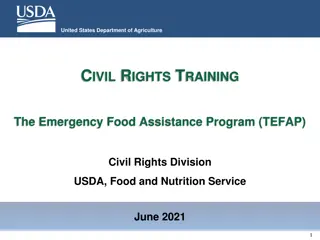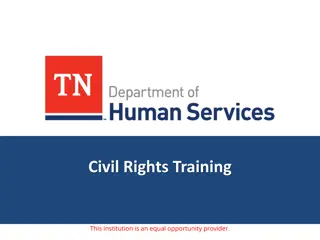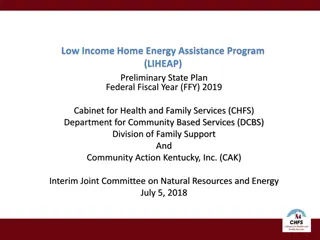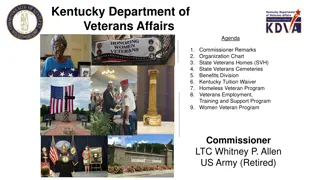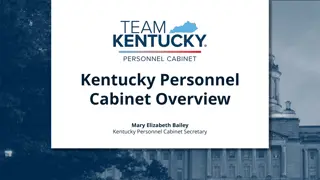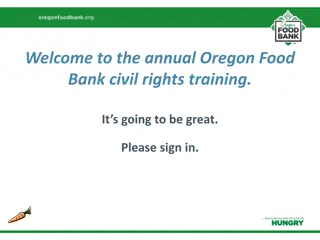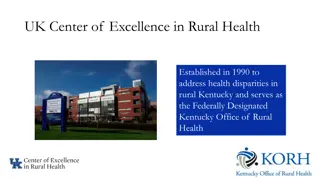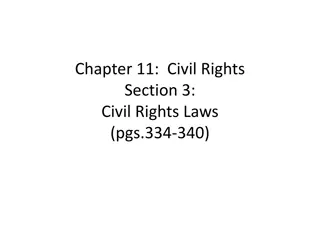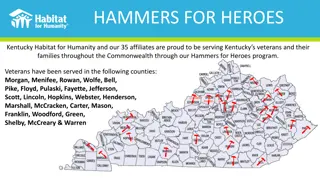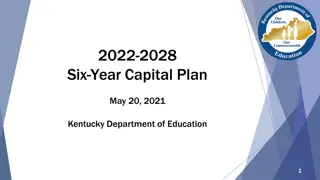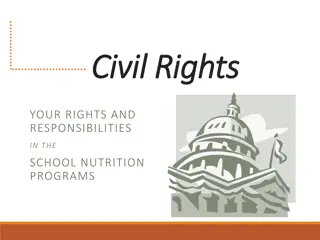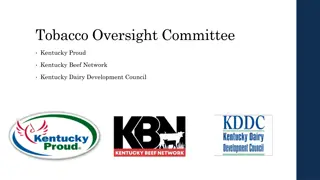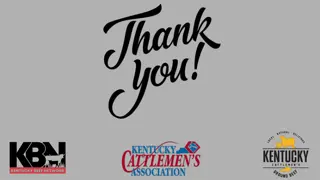TEFAP Program Overview and Civil Rights Training 2020 in Kentucky
This presentation provides an overview of the TEFAP program requirements and Civil Rights training for organizations serving as Sub-Outlets for TEFAP in Kentucky. It covers the purpose, goals, what TEFAP is, the TEFAP Agreement, organizational responsibilities, program requirements, and the importance of posting the And Justice For All Poster. Participants will learn about client intake processes, reporting statistics, and how Civil Rights relate to TEFAP participation.
Download Presentation

Please find below an Image/Link to download the presentation.
The content on the website is provided AS IS for your information and personal use only. It may not be sold, licensed, or shared on other websites without obtaining consent from the author. Download presentation by click this link. If you encounter any issues during the download, it is possible that the publisher has removed the file from their server.
E N D
Presentation Transcript
KENTUCKY TEFAP 2020 TEFAP Policies and Civil Rights Training
PURPOSE This presentation is directed to representatives of organizations that serve as Sub-Outlets for TEFAP to provide an overview of TEFAP program requirements and Civil Rights training.
OUR GOALS Review TEFAP Agreement and related policies/ requirements Review the proper client in-take process for gathering and reporting service statistics Learn about Civil Rights and how they relate to the processes a Sub- Outlet must adopt to participate in TEFAP
WHAT IS TEFAP? The Emergency Food Assistance Program (TEFAP) is a federal program that helps supplement the diets of low- income Americans by providing them with emergency food assistance at no cost. USDA provides 100% American-grown USDA Foods and administrative funds to states to operate TEFAP.
TEFAP AGREEMENT The current version of the TEFAP Agreement became effective on July 1, 2017.
TEFAP AGREEMENTS It is the organization s responsibility to make DTC aware of a staff change in writing 30 days prior to that change to ensure continual program participation. Unlike in the past, the Agreement does not have a dated expiration, but the income guidelines are subject to change at any time and usually do on an annual basis. By signing the Agreement, your agency agrees to the stated USDA and DTC policies, so it is important to read the document in its entirety. As a Sub-Outlet, your agency is required to keep a copy of the current, signed Agreement on file at the agency site; this document must be available for review upon request. *If both parties agree to terminate the Agreement, a written 30-day notice must be given. Un-foreseen circumstances may cause termination in less than 30 days by either or both parties.
TEFAP REQUIREMENTS All of the TEFAP things/processes for which there are no substitutes
TEFAP Sub-Outlets Must Post the And Justice For All Poster in Clear View This poster should be considered the key to the door ; if you can t see it, you can t open the door. What does this poster mean? We cannot discriminate based on: Race Color National origin Gender Religion Age Disability Political beliefs Sexual orientation Marital & family status
Written Notice of Beneficiary Rights The Written Notice of Beneficiary Rights must be posted alongside the And Justice For All poster at faith-based sites. This document identifies an Alternate Service Location which is not faith-based.
Receiving Orders Dare to Care creates the monthly TEFAP orders.* *There are a few exceptions to this rule for agencies with limited storage capacity. Sub-Outlets agree to accept and distribute all of the products on the monthly order; picking and choosing products is not allowed. Sub-Outlets must keep an accurate record of the products received each month. All TEFAP products must be stored separately on shelving labeled USDA ; this rule applies to dry stock shelving, refrigerators, and freezers.
Distributing TEFAP Products Sub-Outlets must use the most-current Commodity Application Register, provided by the KY Dept. of Agriculture, to establish the eligibility of program Applicants; this is done by using the income guidelines each time the Applicant accesses the food stream. (more on this later) All qualifying Applicants must provide their signature to receive TEFAP products. Ideally, TEFAP products should be supplemented with food from other food streams.
Distributing TEFAP Products Homebound Applicants must have a Proxy Form on file at the Sub-Outlet which identifies their Proxy; this establishes the identity of the person/s who are authorized to receive food on the Applicant s behalf. A Proxy must arrive with a dated & signed note from Applicant and his/her own photo ID. The Proxy s photo ID should identify them as the authorized Proxy listed on the Proxy Form the Applicant has on file at the Sub-Outlet. A Proxy should sign his/her own name followed by the word Proxy and the note should be stapled to the back of the Commodity Application Register.
Food Storage & Safety USDA products must be stored in a locked, temperature- controlled place. Dry products must be held on shelving at least 6 inches from the floor and 4 inches from the wall; this rule also applies to fresh produce. Thermometers must be in all dry, refrigerated, and frozen food storage areas, and a separate temperature recording chart must be maintained for each of these storage area. If food loss occurs: the food should be quarantined; photos should be taken of the food; and Dare to Care should be contacted immediately to report the loss and to gain approval for disposal from the KY Dept. of Agriculture. All USDA food must be stored or prepared and distributed from the approved Sub-Outlet site.
Establishing Eligibility Per Income Guidelines Pantry: DTC will forward the most- current Commodity Application Register when the income guidelines are updated. Income is self-declared and no proof of income may be requested Commodity Application Registers must be kept on file and available for review for 3 years plus the current year. Soup Kitchen: Kitchens do not use the Commodity Application Register; they serve all without question. Kitchens must maintain a dated log of the number of people served and number of meals prepared with USDA products. The dated log must be kept on file for 3 years plus the current year.
Reporting Monthly Statistics & Inventory TEFAP service statistics must be entered online via the DTC website by the 7th of every month. Failure to submit statistics and inventory promptly can result in suspension or cancellation of the TEFAP Agreement. USDA commodity inventory must entered online via the DTC website by 7th of every month. It is best to keep TEFAP products in their cases until distribution to ease this process.
WHAT ARE CIVIL RIGHTS? Function: noun plural the nonpolitical rights of a citizen; especially ; the rights of personal liberty guaranteed to United States citizensby the 13th and 14th amendments to the Constitution and by acts of Congress.
NOT SO LONG AGO. Women couldn t vote in the U.S until 1920. Native Americans weren t considered U.S. citizens until 1924. Black and white students were provided seperate restrooms lawfully until 1964. Discrimination was allowed in all public places until 1964. The right to vote was based on literacy tests and poll taxes in many U.S. states until 1964. Institutions with federal funding could discriminate based on gender until 1964.
THE BASIS OF CIVIL RIGHTS TODAY Title VI of the Civil Rights Act of 1964 makes it unlawful to discriminate on race, color, religion, gender, or origin. Title VII of the Civil Rights Act of 1964 makes it unlawful for employers to discriminate based on race, color, religion, gender, or origin. Title IX of the Education Act of 1972 addresses gender discrimination. Section 504 of the Rehabilitation Act of 1973 makes it unlawful to discriminate based on disability. The Age Discrimination Act of 1975 addresses age discrimination. The Americans with Disabilities Act of 1990 also addresses disability discrimination.
UPHOLDING CIVIL RIGHTS How to ensure equality at food pantries or kitchens
STEP 1: PROVIDE EQUAL ACCESS TO PROGRAMS As a TEFAP administrator, YOU and your volunteers are responsible for ensuring everyone has equal access to the USDA food stream. Your agency may not discriminate in program participation on: Race Color National origin Sex Age Disability
STEP 2: PUBLIC NOTIFICATION Civil Rights Statement: TEFAP is an equal opportunity provider- must be printed on all pamphlets, sign in sheets, intake forms and certificates of eligibility in English and Spanish Convey the message of equal opportunity in all photos and other graphics Reach out to un-served or underserved populations And Justice for All Poster: Displayed in a prominent location, in clear view of all who enter Written Notice & Referral Requirements: Displayed Inform potentially eligible persons of programs or changes in programs
STEP 2: PUBLIC NOTIFICATION Include the required nondiscrimination statement on all appropriate agency publications, web sites, posters and informational materials. In accordance with Federal law and USDA policy, this institution is prohibited from discriminating on the basis of race, color, national origin, sex, age or disability, and reprisal or retaliation for prior civil rights activity. To file a complaint (See And Justice for All Poster for remainder of statement)
STEP 3: DATA COLLECTION Maintain all TEFAP records 3 years People self-declare their eligibility by signing the Commodity Application Register; if a person refuses to sign, advise that you or someone else will enter a denial code for them based on perception. All data MUST be secure and confidential
STEP 4: COMMUNICATION What do you do if you are serving someone with limited literacy? TEFAP staff are required to read the And Justice for All poster and complaint notice for all those who are unable to read. What do you do if you are serving someone who doesn t speak English? The And Justice for All poster must be translated or else the agency is at risk of violation of Title VI and its regulations. The poster is available in many languages.
STEP 5: COMMUNICATION For Braille, large print, audiotape communications, contact USDA s TARGET center at 202.720.2600 In Kentucky, for hearing impaired services: http://www.kyrelay.org/ Language Assistance: www.lep.gov
THANK YOU for your attention and participation in TEFAP!
HELPFUL RESOURCES FNS 113-1: www.fns.usda.gov/cr/crregulation.htm www.civilrights.org www.usccr.gov/pubs/pubsndx.htm Dare to Care: www.daretocare.org Feeding America: www.feedingamerica.org





